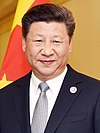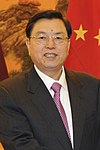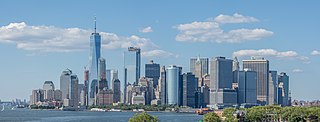
The United States is a highly developed mixed economy. It is the world's largest economy by nominal GDP; it is also the second largest by purchasing power parity (PPP), behind China. It has the world's sixth highest per capita GDP (nominal) and the eighth highest per capita GDP (PPP) as of 2024. The U.S. accounted for 26% of the global economy in 2023 in nominal terms, and about 15.5% in PPP terms. The U.S. dollar is the currency of record most used in international transactions and is the world's reserve currency, backed by a large U.S. treasuries market, its role as the reference standard for the petrodollar system, and its linked eurodollar. Several countries use it as their official currency and in others it is the de facto currency. Since the end of World War II, the economy has achieved relatively steady growth, low unemployment and inflation, and rapid advances in technology.

The world economy or global economy is the economy of all humans in the world, referring to the global economic system, which includes all economic activities conducted both within and between nations, including production, consumption, economic management, work in general, financial transactions and trade of goods and services. In some contexts, the two terms are distinct: the "international" or "global economy" is measured separately and distinguished from national economies, while the "world economy" is simply an aggregate of the separate countries' measurements. Beyond the minimum standard concerning value in production, use and exchange, the definitions, representations, models and valuations of the world economy vary widely. It is inseparable from the geography and ecology of planet Earth.
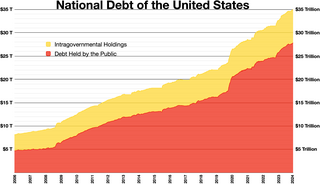
The national debt of the United States is the total national debt owed by the federal government of the United States to Treasury security holders. The national debt at any point in time is the face value of the then-outstanding Treasury securities that have been issued by the Treasury and other federal agencies. The terms "national deficit" and "national surplus" usually refer to the federal government budget balance from year to year, not the cumulative amount of debt. In a deficit year the national debt increases as the government needs to borrow funds to finance the deficit, while in a surplus year the debt decreases as more money is received than spent, enabling the government to reduce the debt by buying back some Treasury securities. In general, government debt increases as a result of government spending and decreases from tax or other receipts, both of which fluctuate during the course of a fiscal year. There are two components of gross national debt:
The economies of Canada and the United States are similar because both are developed countries. While both countries feature in the top ten economies in the world in 2022, the U.S. is the largest economy in the world, with US$24.8 trillion, with Canada ranking ninth at US$2.2 trillion.

The Yangtze Delta or Yangtze River Delta, once known as the Shanghai Economic Zone, is a megalopolis generally comprising the Wu-speaking areas of Shanghai, southern Jiangsu, northern Zhejiang, southern Anhui. The area lies in the heart of the Jiangnan region, where the Yangtze drains into the East China Sea. Historically the fertile delta fed much of China’s population, and cities and commerce flourished. Today, it is one of China’s most important metropolitan area and is home to China’s financial center, tourist destination and hub for manufacture ranging from textile to car-making. In 2021, the Yangtze Delta had a GDP of approximately US$4.3 trillion, about the same size as Japan.
In justifying opening up and the series of economic reforms that ensued in China, Deng Xiaoping referred to Karl Marx and his theories, which predicted that nations need to undergo urbanization and a stage of capitalism for a natural socialist transition. One of the most renowned reforms under Deng was establishing four "special economic zones" along the Southeastern coast of China, with Shenzhen, Shantou, and Zhuhai located in Guangdong province and Xiamen located in Fujian province. The four aforementioned special economic zones were all established from 1980 to 1981. As of 2024, there have been 3 additional special economic zones. In 1988, Hainan became the fifth "SEZ". In 1990, Pudong district in Shanghai became the sixth "SEZ". In 2009, Binhai district in Tianjin became the seventh "SEZ". Special economic zones (SEZs) in mainland China are granted more free market-oriented economic policies and flexible governmental measures by the government of China, compared to the planned economy elsewhere.

The United States budget comprises the spending and revenues of the U.S. federal government. The budget is the financial representation of the priorities of the government, reflecting historical debates and competing economic philosophies. The government primarily spends on healthcare, retirement, and defense programs. The non-partisan Congressional Budget Office provides extensive analysis of the budget and its economic effects. CBO estimated in February 2024 that Federal debt held by the public is projected to rise from 99 percent of GDP in 2024 to 116 percent in 2034 and would continue to grow if current laws generally remained unchanged. Over that period, the growth of interest costs and mandatory spending outpaces the growth of revenues and the economy, driving up debt. Those factors persist beyond 2034, pushing federal debt higher still, to 172 percent of GDP in 2054.
The economic policy and legacy of the George W. Bush administration was characterized by significant income tax cuts in 2001 and 2003, the implementation of Medicare Part D in 2003, increased military spending for two wars, a housing bubble that contributed to the subprime mortgage crisis of 2007–2008, and the Great Recession that followed. Economic performance during the period was adversely affected by two recessions, in 2001 and 2007–2009.

The economy of the People's Republic of China is a developing mixed socialist market economy, incorporating industrial policies and strategic five-year plans. China is the world's second largest economy by nominal GDP, behind the United States, and since 2017 has been the world's largest economy when measured by purchasing power parity (PPP). China accounted for 19% of the global economy in 2022 in PPP terms, and around 18% in nominal terms in 2022. The economy consists of state-owned enterprises (SOEs) and mixed-ownership enterprises, as well as a large domestic private sector which contribute approximately 60% of the GDP, 80% of urban employment and 90% of new jobs, the system also consist of a high degree of openness to foreign businesses. According to the annual data of major economic indicators released by the National Bureau of Statistics since 1952, China's GDP grew by an average of 6.17% per year in the 26 years from 1953 to 1978. China implemented economic reform in 1978, and from 1979 to 2023, the country's GDP growth rate grew by an average of 8.93% per year in the 45 years since its implementing economic reform. According to preliminary data released by the authorities, China's GDP in 2023 was CN¥126.06 trillion with a real increase of 5.2% from 2022.
The 2nd Session of the 11th National People's Congress was the annual meeting of the highest legislative body of the People's Republic of China, which was held in March 2009 at the Great Hall of the People in Beijing. The event began on March 5 and lasted until March 13. The Congress was followed closely because of the possible impact any policy changes would have on the Chinese and world economy. Major issues discussed at the Congress include the 2007–2008 financial crisis, economy of China, curbing unemployment, and social welfare.
The 3rd Session of the 11th National People's Congress held its annual meeting in March 2010 at the Great Hall of the People in Beijing, China. The event opened on March 5, 2010 and concluded on March 14, 2010.
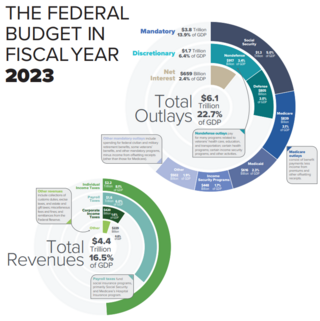
Deficit reduction in the United States refers to taxation, spending, and economic policy debates and proposals designed to reduce the federal government budget deficit. Government agencies including the Government Accountability Office (GAO), Congressional Budget Office (CBO), the Office of Management and Budget (OMB), and the U.S. Treasury Department have reported that the federal government is facing a series of important long-run financing challenges, mainly driven by an aging population, rising healthcare costs per person, and rising interest payments on the national debt.
The 5th Session of the 11th National People's Congress held its annual meeting in March 2012 at the Great Hall of the People in Beijing, China. The event opened on 5 March and concluded on 14 March. Premier Wen Jiabao delivered his work report as Premier.

The economy of Beijing ranks among the most developed and prosperous cities in China. In 2013, the municipality's nominal gross domestic product (GDP) was CN¥1.95 trillion. It was about 3.43% of the country's total output, and ranked 13th among province-level administrative units. Per capita GDP, at CN¥93,213 (US$15,051) in nominal terms and Int $21,948 at purchasing power parity, was 2.2 times the national average and ranked second among province-level administrative units.
The 2013 National People's Congress held its annual meeting in March 2013 at the Great Hall of the People in Beijing, China. The session opened 5 March and concluded on 16 March, 2013 This was the Session in which major state positions were elected.
The economic policy of the Donald Trump administration was characterized by the individual and corporate tax cuts, attempts to repeal the Affordable Care Act ("Obamacare"), trade protectionism, immigration restriction, deregulation focused on the energy and financial sectors, and responses to the COVID-19 pandemic.
The 2019 National People's Congress, or the Second Session of the 13th National People's Congress, was held in March 2019 at the Great Hall of the People in Beijing, China. The session opened on 8 March and concluded on 20 March. Major state positions were elected in this session.
Liu Guoqiang is a former Chinese politician. He spent his entire career in his home-province Liaoning. He was investigated by the Central Commission for Discipline Inspection in July 2020, and has since retired. Prior to that, he served as vice-chairman of the Liaoning Provincial Committee of the Chinese People's Political Consultative Conference (CPPCC) from 2013 to 2017, vice-governor of Liaoning from 2001 to 2013, and mayor of Benxi from 2000 to 2001. He was a delegate to the 10th and 11th National People's Congress.
The 2024 National People's Congress (NPC) was the Second Plenary Session of the 14th National People's Congress of the People's Republic of China (PRC). It was held from 5 March to 11 March 2024, concurrently with the Chinese People's Political Consultative Conference (CPPCC) as part of the annual Two Sessions. The NPC was held at the Great Hall of the People in Beijing.
The Tenth five-year plan is a plan for China's national economic and social development for the 2001-2005 period. With economic development as its main goal, the plan establishes the strategic adjustment of the economic structure as its main line, while focusing on ecological construction, environmental protection, and sustainable economic and social development. Various social programs such as education, culture, healthcare and sports were also emphasized.
